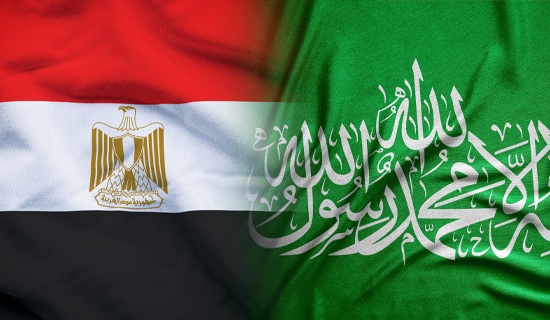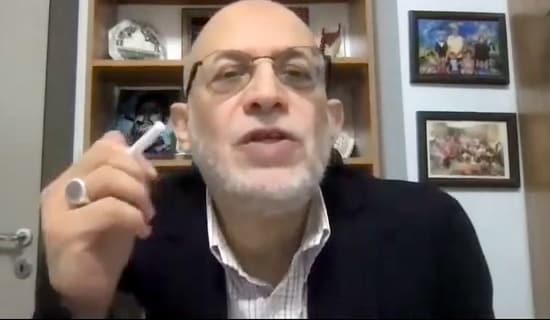A draft law to ban the niqab (full-face veil) in public places, which was recently submitted by Egyptian MPs, stirred a heated public debate in the country, and articles for and against it were published in the Egyptian press.
The issue of the Islamic dress code for women periodically comes up for debate in Egyptian society. This also happened several months ago after Egyptian actress Hala Shiha, who has been living in Canada for the last few years, announced that she would return to acting and appeared in the media with her head uncovered. This announcement came 12 years after the actress quit show business to take up a religious lifestyle, as part of which she donned a hijab (which covers a woman's hair and shoulders but not her face) and occasionally even a niqab. According to reports, she has also shut down a Facebook page on which she used to post religious materials preaching Islam and promoting the veil.[1]

Shiha with and without the hijab (image: Al-Shurouq, Egypt, August 9, 2018)
In an interview with the Egyptian daily Al-Yawm Al-Sabi', during which she was photographed bareheaded alongside the daily's editor Hani 'Izzat, Shiha said that the decision to resume her acting career had been difficult and had been taken after deep deliberation.[2] In an interview on the Egyptian satellite channel Dream TV she said that she stopped wearing the niqab when she moved to Canada, since it was at odds with the environment there. She added that her removal of the veil did not mean she had left the religion: "The most important thing for a woman is [her] morals, and the hijab is not a measure of religious piety at all... I know many were enraged by my discarding of the hijab, but the hijab is [just one] part of the religion, not the entire religion, and I have not left [Islam]... Every person goes through different stages in life and various upheavals, during which he learns a great deal."[3]

Shiha with Hani 'Izzat (image: Al-Yawm Al-Sabi', Egypt, August 8, 2018)
Shiha's decision and her statements about it sparked a heated debate on social media and Egypt's traditional media. Some – including Egypt's Religious Endowments Minister and other Islamic preachers, as well as Salafis and women activists of the Muslim Brotherhood (MB) – opposed her action and called on her to repent, while others – mainly liberal intellectuals and journalists – applauded her and launched hashtags like "#Waiting for you, Hala." Reactions in support of Hala were also published by journalists and columnists in the Egyptian press. They wrote that the decision whether to don the hijab was hers to make and nobody had the right to interfere in it. Many of them also stated that Hala was an example of a broader phenomenon of women who fell victim to MB preaching, and that her current decision is an act of defiance against the MB and another sign that the Salafis and the movements of political Islam, which are trying to force their "distorted" views on Egyptian society, are collapsing.
This report reviews the debate sparked in Egypt by Hala Shiha's decision to stop wearing the hijab.
Egyptian Religious Endowments Minister, Women MB Activists, Salafi Sheikhs Urge Hala Shiha To Put Hijab Back On
As stated, criticism of Shiha's move was heard from clerics, MB activists and Salafis. Egypt's Religious Endowments Minister Mohamed Mokhtar Gomaa said about this affair, in an interview on Al-Mihwar TV, that there is no coercion in Islam and that clerics can only advise people, whose ultimate reckoning is with Allah. He added, however, that "a woman's entire body is awrah [nudity], except for her face and hands. That is the opinion of the religion, and that is what we preach."[4]
Conspicuous among the reactions to Shiha's decision were those by women MB activists, who expressed sorrow about it and called on her to repent. Senior MB activist Ayat 'Orabi wrote on her Facebook page that Shiha is a victim of Egyptians who corrupted her: "Speaking as a Muslim woman, it pains me to see [people] celebrating the about-face made by a Muslim woman who has removed her hijab... I am talking about the explicit war on Islam that was launched when a Muslim woman removed her hijab... I see people trying to undress this Muslim woman and expose her shame, and return her to the shady [world] of entertainment and cinema where there are disreputable women who take off their clothes... One month, during which she left her home in Canada and visited Egypt, that has become a lair of the devil, was enough time for people to gather around her and whisper in her ear to take off her niqab. I say to Hala Shiha: Take your luggage, leave Egypt and go back to where you came from. Flee from these people with your religion [intact], and beg Allah to save you from what has been whispered [in your ear]."[5]
Khadija Khayrat Al-Shatir, daughter of Khayrat Al-Shatir, the MB's former general guide who is currently incarcerated in Egypt, likewise urged Shiha to reconsider her decision.[6] Amira 'Izzat, daughter of the MB deputy general guide Muhammad 'Izzat, who has fled Egypt, posted on Facebook that Shiha, whom she claims was once a close friend, is fickle in her opinions.[7] Shiha stated in response that she had spoken to Amira 'Izzat only twice in her life.[8]
Salafi sheikh Muhammad l-Sawi posted on his Facebook page a video in which he wept over Shiha's decision. He claimed that she spoke to him last Ramadan and told him she was happy in her decision to wear the niqab.[9] Writer under the hashtag "#Waiting for you, Hala," Salafi sheikh Hazem Shouman likewise called on Shiha to resume wearing the hijab.[10]
Many other Egyptian Facebook and Twitter users responded in a similar vein. Facebook user Pransech Mariah wrote: "Girls, use the hashtag '#Waiting for you, Hala.' Maybe we can persuade her to return to Allah."[11] Twitter user Ahmed Elaskary wrote under this hashtag: "Allah, return her to obedience and to the path of Your Paradise. Allah, strengthen your religion in our hearts."[12] Several other users likewise hoped that Allah would cause Shiha to repent her ways.[13]
Intellectuals Support Shiha, Accuse MB Of Using Hijab To Control Women, Society
Conversely, Egyptian liberals applauded Hala Shiha's decision. On his program on the LBC channel, journalist and TV host Muhammad Al-Ghayti called on others to follow her example, saying: " Hala Shiha has returned [to us] from the bosom of extremism and fanaticism. If you want to draw closer to Allah, engage in respectable artistic activity that demonstrates the moderate and humane nature of the faith."[14]
Some also condemned the MB and the Salafis who had attacked Shiha for removing her hijab, saying that they were using the issue of the hijab to dominate the public sphere. Egyptian writer, poet and translator Fatima Na'out told the Egyptian daily Al-Masri Al-Yawm: "Because of the emptiness that characterizes them, the MB and the Salafis are afraid of losing their merchandise, which has no buyers, and that is why they see the loss of a single female follower –Hala Shiha – as a threat to their terrorist enterprise. I saw a Salafi sheikh weeping over [her] removal of the hijab, yet he does not weep over a hungry little girl or over other little girls who sit on the street without shelter. I did not see [these sheikhs] shed any tears when Jerusalem became the capital of Israel..."[15]
Egyptian MP Dr. Amna Nasir, a former lecturer at Al-Azhar, slammed the MB and the Salafis for making political use of the hijab issue, saying: "[Wearing] the hijab is a commandment of Allah. Modest dress for women is a fundamental principle decreed by the monotheistic faiths, not by any political stream. The stubborn adherence to it by certain groups, like the Salafis and the MB, has created a distorted association between them and this [form of] dress, and this confusion has cast a stain on this modest form of dress."[16]
Support for Shiha and criticism of the MB were also expressed on social media. User Rasha tweeted: 'Welcome [back] to life, Hala."[17] Another user, who describes herself as a secular Egyptian, tweeted: "Outward [signs] of religiosity, such as the hijab and the niqab, are just political symbols invented by the religious organizations as proof of their domination of the public sphere and in order to demonstrate their control of the public."[18] Egyptian journalist Yasmin Mahfouz tweeted: "The crisis that ensued after Hala Shiha removed the niqab and later the hijab... proves that anyone who leaves the fold of the MB is sentenced to death."[19]
Egyptian Journalists: Shiha's Case Exemplifies The Struggle Against The MB And Radical Islam
SUPPORT OUR WORK

As stated, the affair was also widely discussed in the Egyptian press. Many articles supported Shiha, saying that her decision was an act of defiance against political Islam and especially the MB, who, they said, use the hijab to impose their extremist ideas on society.
Egyptian Journalist And Politician: Shiha Fell Victim To The Brutal Promotion Of The Hijab By The MB As A Means Of Controlling Women
In an article in the government daily Al-Ahram, Egyptian journalist and politician Osama Al-Ghazali Harb contended that Shiha's case was an example of a broader phenomenon in Egypt whereby young women don the hijab after being exposed to MB preaching. He wrote: "I noticed the uproar in the media and on social media after young actress Hala Shiha removed her hijab. Apparently she previously used to wear a niqab, and [now] she has gone back to wearing ordinary clothes. What a person wears is his private business and an individual freedom in which that nobody should interfere... but I discovered that the affair goes far beyond the personal sphere and reflects cultural and political aspects that cannot be ignored...
"I was surprised to hear one of the preachers weeping on social media and lamenting Hala's removal of her hijab. [But] things became clearer when I saw an MB preacher, [the journalist] Ayat 'Orabi, who fled [from Egypt to the U.S. and is accused of treason against her homeland], express great sorrow over Hala's renunciation of the hijab and especially over her return to the artistic circles...
"I'm sure that Hala, like millions of young Muslim women of her generation, who sincerely wished to become devout, fell victim to brutal preaching that taught them that Islam is [synonymous with] the hijab, niqab and galabiya [a long gown] – preaching by the MB, which regards the hijab and niqab as proof that its ideology is penetrating [into society] and as a means for controlling the women of our country. However, Hala's natural, brave and responsible conduct, and her intelligent comments about her experience, show that it was the experience of a young Muslim woman who searched, tried, and understood. This is not [just] a personal story but part of a general [social] problem that must be addressed and analyzed."[20]
Egyptian Columnist: By Removing The Hijab Shiha Raised The Banner Of Life And Toppled Political Islam
Al-Ahram columnist 'Abd Al-Mu'ti Higazi wrote that the hijab serves the Islamic organizations as a tool for imposing its extremist Islam on masses and that Shiha had defied these organizations: "When the actress Hala Shiha took off her hijab and niqab and returned to her former look, with an exposed, beaming face, it was a simple and innocent act that crushed all the evil that the extremist religious organizations built up in the last half century. [It was an act that] lowered the banner of the black plague and raised instead the banner of life...
"The MB used the language of the hijab to say: 'We were defeated in the June [1967] war [with Israel] because we distanced ourselves from Islam, and a return to Islam begins with the hijab, to which everyone must be committed which [all] women must wear'... Since [the practice of wearing] the hijab was common among the simple folk, the organizations of political Islam used it to woo the masses, who saw its growing prevalence as their victory, and then they [the masses] were recruited to [the process of] Islamizing the country by means of constitutional amendments, laws and fatwas that turned it into a religious state.
"But everything that the backward extremist organizations built is about to collapse, and the reactions to Hala's removal of the hijab and niqab are proof of this. The organizations of political Islam have collapsed... since Hala Shiha took down their black banner and raised her banner instead, and because all the enlightened [members of] society stood up and saluted Hala's flag as though it was the flag of Egypt... We should start following in her footsteps and continue on the path, knowing that we will win..."[21]
Egyptian Writer: Shiha's Case Exemplifies The Struggle To Renounce The Distorted Religious Notions Of The Salafis
Dr. Muhammad Fayad, a lecturer at the University of Tanta who writes for the independent Egyptian daily Al-Maqal, stated that Hala's case demonstrated the failure of the Salafis and extremist preachers to shackle Egyptian society by means of the hijab: "Hala Shiha, who quit [acting] years ago, had never been a first-rate star but only a hard-working actress at the beginning [of her career] who was attacked by the Salafi virus and vanished for a long time, miraculously transforming into an Islamic preacher... She disappeared from the scene because her hungry soul felt that the Salafi ghetto and the black niqab would satisfy its hunger, but when that did not happen she reappeared and announced that she had removed the hijab and would return to the Egyptian art scene. The so-called devout Muslims [immediately] began crying and shrieking: 'Come back, Hala, don't give the secularists cause to delight in our defeat, do not drop the banner of Islam. You are a role model, do not stab Islam with a poisoned dagger.' Hala's return [to show business] was a real tragedy for the Salafis, who are like vampires in a Hollywood movie that scream and burn up whenever they see sunlight...
"To tell the truth, Hala does not interest me and neither do her return [to show business] or her hijab. What really interests me is the extreme panic on the [social media] pages and in the videos posted by Salafis and other so-called devout Muslims when the plan of [preachers] 'Amru Khaled, Muhammad Hassan and their friends... to swathe our [entire] society in a hijab and blacken it [with a niqab] failed so completely...
"Since 2000, the advent of satellite dishes, including in the villages and in public places... caused the spread of religiosity [manifested in] outward characteristics [like] clothing. Many women started wearing the niqab and many men wore short white galabiyas. The programs on satellite channels, led by [preacher Muhammad] Hassan, broadcast extremist fatwas [issued] in response to religious questions, which caused fundamentalist diseases to take root in Egyptian society...
"How fascinating that this piece of cloth which Hala Shiha discarded also exposed the panic of the Salafis. The battle for the Egyptian mind is clearly about to be decided. The intellectuals of this country have managed to make many people change their minds about the shallow perceptions and benighted culture [of the Salafis]. The Egyptian mind has freed itself of the Salafis almost completely, just as it freed itself of MB rule. We are facing a tremendous battle, the battle to rehabilitate Egyptian thought by shaking off all the dust of misguided religious notions, the exclusion of the other, and the darkness of the hijab that shackled the Egyptian spirit for years. Remove this darkness from Egypt and follow Hala's example: [let us] become thousands of Halas or 50 million Halas."[22]
* C. Meital is a research fellow at MEMRI.
[1] Sada Al-Balad (Egypt), August 10, 2018.
[2] Al-Yawm Al-Sabi' (Egypt), August 8, 2018.
[3] Al-Masri Al-Yawm (Egypt), August 11, 2018.
[4] Al-Yawm Al-Sabi' (Egypt), August 14, 2018.
[5] Facebook.com/AyatOrabi55, August 9, 2018.
[6] Facebook.com/khadeija.elshater, August 9, 2018.
[7] Al-Yawm Al-Sabi' (Egypt), August 9, 2018. It should be noted that her original post appears to have been removed from her page.
[8] Al-Watan (Egypt), August 11, 2018.
[9] Al-Masri Al-Yawm (Egypt), August 8, 2018.
[10] Facebook.com/DrHazemShouman, August 9, 2018.
[11] Facebook.com/pransech.mariah,August 10, 2018.
[12] Twitter.com/ahmed_elaskary, August 9, 2018.
[13] Facebook.com/zeinab.abdelrazek.sayed, August 8, 2018.
[14] Al-Misriyyoun (Egypt), August 9, 2018.
[15] Al-Masri Al-Yawm (Egypt), August 9, 2018.
[16] Al-Masri Al-Yawm (Egypt), August 9, 2018. In this context it should be noted that in 2017, after Al-Azhar issued a fatwa that the niqab is not mandatory in Islam, Nasir wrote in agreement that Islam mandated only the wearing of the hijab, and added that wearing the niqab was actually a Jewish custom that the Muslims learned from the ancient Jewish tribes in the Arabian Peninsula. See Al-Misriyyoun (Egypt), August 13, 2017, Al-Watan (Egypt), August 15, 2017. In 2016 she was one of a group of MPs who submitted a previous draft law to ban the niqab in public places, an initiative that did not succeed. Al-Yawm Al-Sabi' (Egypt), March 5, 2016.
[17] Twitter.com/rasha_hm, August 8, 2018.
[18] Twitter.com/A_B_Horreya1234, August 8, 2018.
[19] Twitter.com/YasminMahfouz, August 8, 2018.
[20] Al-Ahram (Egypt), August 13, 2018.
[21]Al-Ahram (Egypt), August 22, 2018.
[22] Al-Maqal (Egypt), August 16, 2018.




